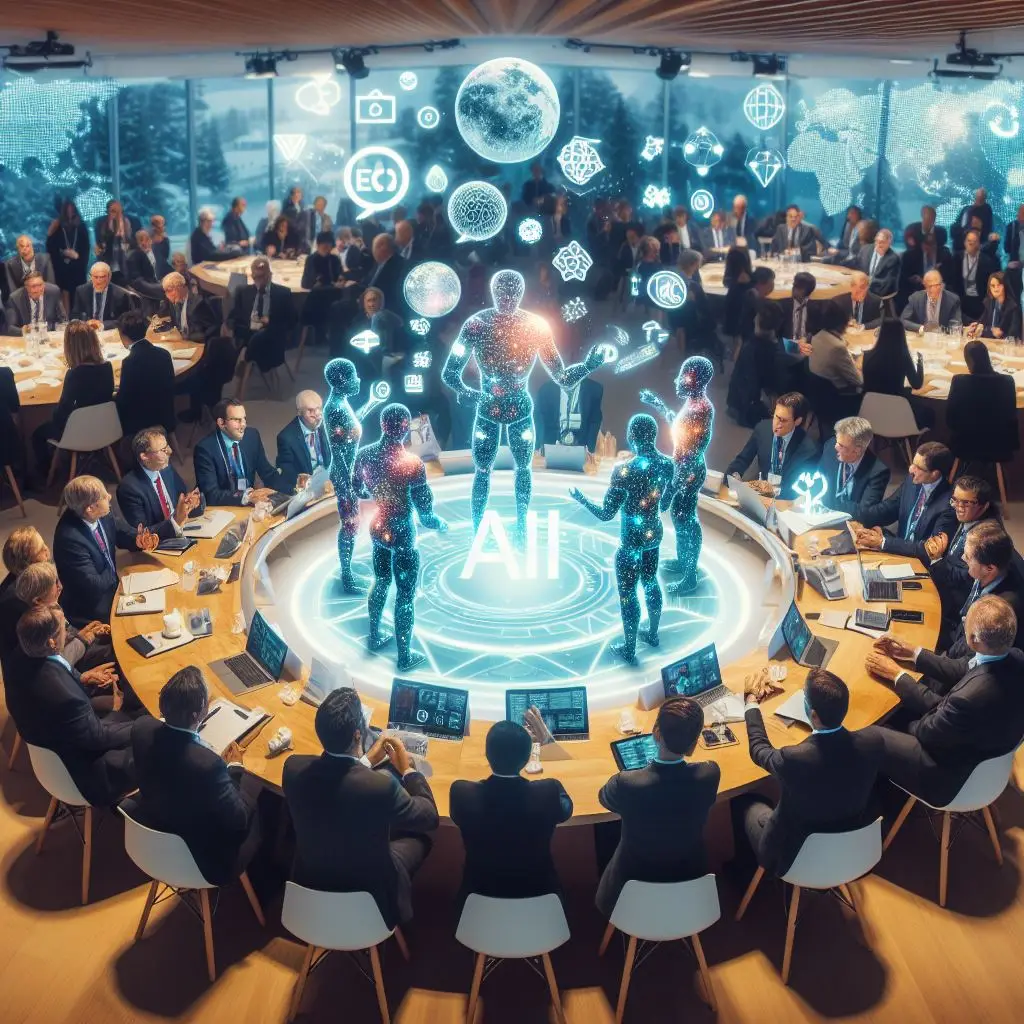The World Economic Forum (WEF) in Davos, Switzerland, stands as a pinnacle of global discourse, where leaders from various sectors converge to address pressing issues. At the forefront of this year's discussions is artificial intelligence (AI), a transformative technology reshaping economies, societies, and governance structures worldwide. Prominent figures such as Sam Altman, Satya Nadella, Yann LeCun, and Mustafa Suleyman are leading conversations on AI's implications and its role in shaping the future.
One of the most significant revelations at this year's forum is OpenAI's collaboration with the Pentagon on cybersecurity projects. This announcement comes amid debates surrounding the ethical use of AI in military contexts and highlights the complex intersection of technology, security, and ethics. The decision to revise OpenAI's Terms of Service to permit military applications raises important questions about accountability, transparency, and the potential consequences of AI weaponization.
The commitment to combatting election disinformation underscores the critical role AI plays in safeguarding democratic processes. With the proliferation of AI-generated content, including deepfake images and videos, the threat of misinformation has reached unprecedented levels. Developing AI-powered tools to detect and mitigate false information is essential for preserving the integrity of elections and democratic institutions worldwide.
Sam Altman's advocacy for climate-friendly power in AI research sheds light on the environmental implications of technological innovation. As AI models grow in complexity and size, the energy required for training and inference increases exponentially. Addressing this energy challenge requires a multifaceted approach that combines advances in AI efficiency with investments in renewable energy sources and sustainable computing infrastructure.
Satya Nadella's call for a global regulatory framework reflects the growing consensus on the need for responsible AI governance. While acknowledging the diverse regulatory landscapes across jurisdictions, Nadella emphasizes the importance of establishing common ethical principles and standards. By fostering international collaboration, policymakers can navigate the ethical, legal, and societal implications of AI deployment while promoting innovation and safeguarding human rights.

The forum serves as a platform for stakeholders to exchange ideas, share best practices, and explore collaborative initiatives aimed at harnessing AI for societal benefit. By fostering interdisciplinary dialogue and engaging diverse perspectives, Davos catalyzes efforts to address the complex ethical, societal, and geopolitical dimensions of AI.
The discussions surrounding AI at the World Economic Forum in Davos underscore the need for collective action to ensure AI's responsible and ethical development and deployment. From mitigating cybersecurity threats to combating misinformation and promoting environmental sustainability, AI's role in shaping the global agenda cannot be overstated. As stakeholders navigate the opportunities and challenges presented by AI, Davos serves as a catalyst for forging alliances, fostering innovation, and advancing responsible AI governance.
In light of the COVID-19 pandemic, the forum also explores the role of AI in pandemic response and preparedness. From contact tracing and vaccine distribution to predictive analytics and drug discovery, AI holds promise in accelerating the global response to public health crises. However, concerns about data privacy, algorithmic biases, and digital inequalities must be addressed to ensure equitable and ethical deployment of AI-driven solutions.
Discussions at Davos extend beyond the technological aspects of AI to encompass its socio-economic implications. As AI-driven automation reshapes labor markets and disrupts traditional industries, policymakers and businesses must collaborate to mitigate job displacement and foster reskilling and upskilling initiatives. Additionally, AI's potential to exacerbate existing inequalities underscores the importance of inclusive AI development and equitable access to its benefits.
The forum provides a platform for exploring the ethical dilemmas posed by AI, including issues of algorithmic fairness, transparency, and accountability. As AI systems become increasingly autonomous and opaque, ensuring that they align with ethical principles and respect human rights becomes paramount. Collaborative efforts to develop ethical guidelines, codes of conduct, and accountability mechanisms can help mitigate risks and foster trust in AI technologies.
The role of AI in addressing climate change is another key theme at Davos, with discussions focusing on its potential to optimize energy systems, improve resource management, and facilitate climate modeling. By harnessing AI's analytical capabilities, stakeholders can develop more accurate climate projections, optimize renewable energy deployment, and enhance climate resilience strategies. However, integrating AI into climate action efforts requires robust governance frameworks to ensure that AI solutions align with sustainability goals and prioritize environmental stewardship.
The World Economic Forum in Davos provides a unique opportunity to explore the multifaceted dimensions of AI and its impact on society, economy, and environment. From cybersecurity and democracy preservation to climate action and ethical considerations, AI's prominence in Davos reflects its status as a defining technology of the 21st century. By fostering collaboration, innovation, and responsible governance, Davos can help harness the transformative potential of AI while addressing its challenges and ensuring that it serves the common good.









Add a Comment: